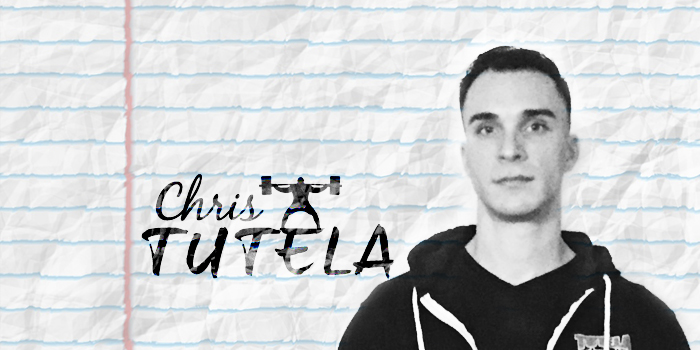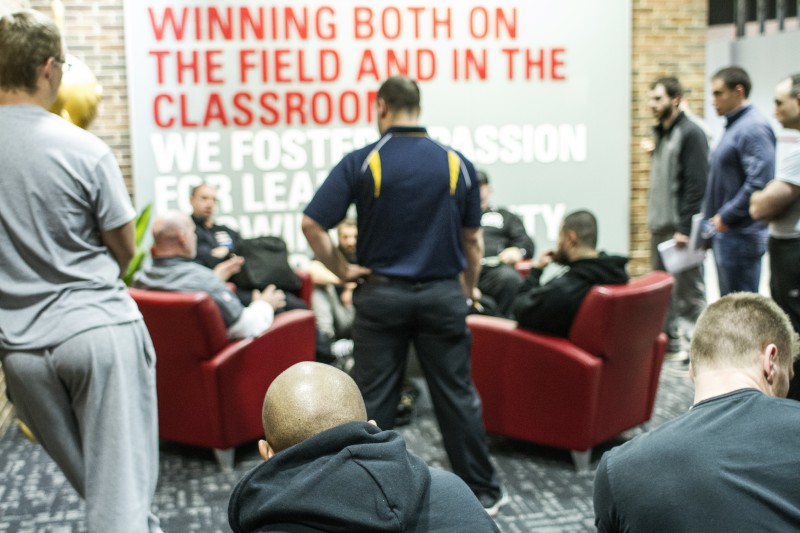
Since 2006, I have been working as a strength and conditioning coach. I have worked with athletes of all different levels, as well as people from all walks of life in the general population. Through research, seminars, books, workshops, articles, and application on athletes, clients, and myself, I have learned many valuable lessons as a coach. Believe me, I still have so much more to learn and will continue to grow. But I wanted to write this article to help out any aspiring strength and conditioning coach or trainer who may need some advice along the way.
I put together a list of things that would have helped me tremendously over the years that I think you can all benefit from. Here is a list of six lessons I have learned over the years that I feel are vital for any new coach out there.
Lesson #1: You've gotta be in the trenches.
If you really want to excel as a strength coach or trainer then you better be putting in your sweat equity. There are many armchair experts out there giving advice on nutrition and training while they’re eating cheese balls and haven’t trained since their high school football days. If you want to find out what really works then you better be in the gym week in and week out putting in work.
If you can’t do something, how can you expect your clients or athletes to do it?
RECENT: A Smarter Approach to Enhancing Athletic Performance
There are many coaches out there who are extremely smart and educated but have minimal practical application of their knowledge. You cannot accept that for yourself if you ever want to be taken seriously as a coach. Putting the iron in your hands and working through the pain of hard god damn work will teach you way more than some text book or weekend certification ever will.
Read the books, attend events, gain knowledge in any way you possibly can, but then APPLY IT!
Lesson #2: Get a mentor.
As far as training goes, I was fortunate enough to have two incredible mentors right from the get-go. However, from the business side of things I certainly did not. I made mistake after mistake after mistake. It wasn’t until I sought out a mentor for business that I was able to actually make a consistent income. Regardless, if you want to be great, you cannot do it alone. Seek out the experts in the training world. Pay them, intern for them, and do what you have to do to be able to learn from them firsthand.
They have already made the mistakes that you don’t have to if you reach out for their guidance. Yes, this can get costly. However, there is no price too high for the invaluable information you will gain from a good mentor. It is necessary for success, so invest what you have— whether that be your time or your money—in a good mentor.
Lesson #3: Become obsessed and constantly learn.
A good coach is constantly reading, learning, taking courses, and applying information gained. To excel in this business you have to become obsessed with this business. You have to love it. If you don’t, you will burn out.
This is not a nine-to-five job. You will be working early mornings, late nights, afternoons, and constantly doing your research. If you don’t truly love this business you will never last, so make sure this is what you want to do.
Once you decide, obsession is necessary. You have to live it!
Lesson #4: Everything does not work for everybody.
You may attend a course or learn some new information that seems awesome. You may try it out on yourself and love it, but then shortly after find out that it sucks for someone else. Understand that everything does not work for everyone. It is your job to try out different things and see what works best for your clients or athletes.
Something might be incredible for an athlete that plays one sport a year, but is horrible for a multi-sport athlete. Or a beginner might benefit from more frequency than an advanced guy would.
Again, this comes down to practical application of your knowledge. It’s great to stay up-to-date on new studies and theories, but you will learn that some methods are great for certain people, some methods suck for certain people, and some are just total bullshit.
Lesson #5: Stick with the stuff that has been time-tested.
Over the years, you will see something that comes out and becomes the new trend. Everyone will love it for a while, then someone will come out and tell you why it sucks. This can become super confusing for new coaches.
However, if you stick with the things that have been around forever, like big multi-joint movements, pressing, loaded carries, pushing, pulling, dragging, sprinting, jumping, throwing, and crawling, you will understand why these movements have been around for so long.
Because they PRODUCE RESULTS!
Of course, you may have to modify big barbell lifts for some people who may be tight, injured, etc. But there are always safer variations you can apply. In the day and age of group training, modifying a program to fit an individual’s needs, combined with good coaching, is what separates good facilities from the shit out there.
Stick with what has been proven to work for centuries and put your own twist on things.
Lesson #6: Harder does not necessarily mean better.
I mentioned in my last article that anyone can make you tired, but not anyone can make you better. When I first started, I thought I had to crush everyone with the same workouts I was using on myself. I thought I had to make my clients feel like they were near death after every training session. Fainting, puking and feeling like shit was becoming the norm. What I didn’t realize at the time was that pushing a weak, deconditioned middle-aged dude to that point was completely unnecessary and detrimental to their health and progress.
What you need to look at is your client or athlete’s long-term progress. Is what you’re doing today going to benefit them a year from now? I didn’t look at it that way back then. I didn’t realize that practically anyone could prescribe a fuck-load of volume and make someone puke.
And don’t get me wrong, there is a time and a place for a “gut-check” type of session. But killing someone at every session is only going to roast their CNS in the long run. Be smart about your programming and don’t just try to crush them for the hell of it. Progress is key, so take a look at the data you collect to make sure your clients are making it.
So, if you want to become a better coach, take advantage of these six lessons I have learned over the years. Stay in the trenches, get a mentor, become obsessed with your work, be aware that not everything works for everybody, stick to the stuff that has been proven to work for centuries, and know that just because something is hard doesn’t mean it’s going to produce results.
I really hope this post helps. If you guys have any questions feel free to shoot us an email at info@tutelatraining.com. I would love to answer any questions you may have.











